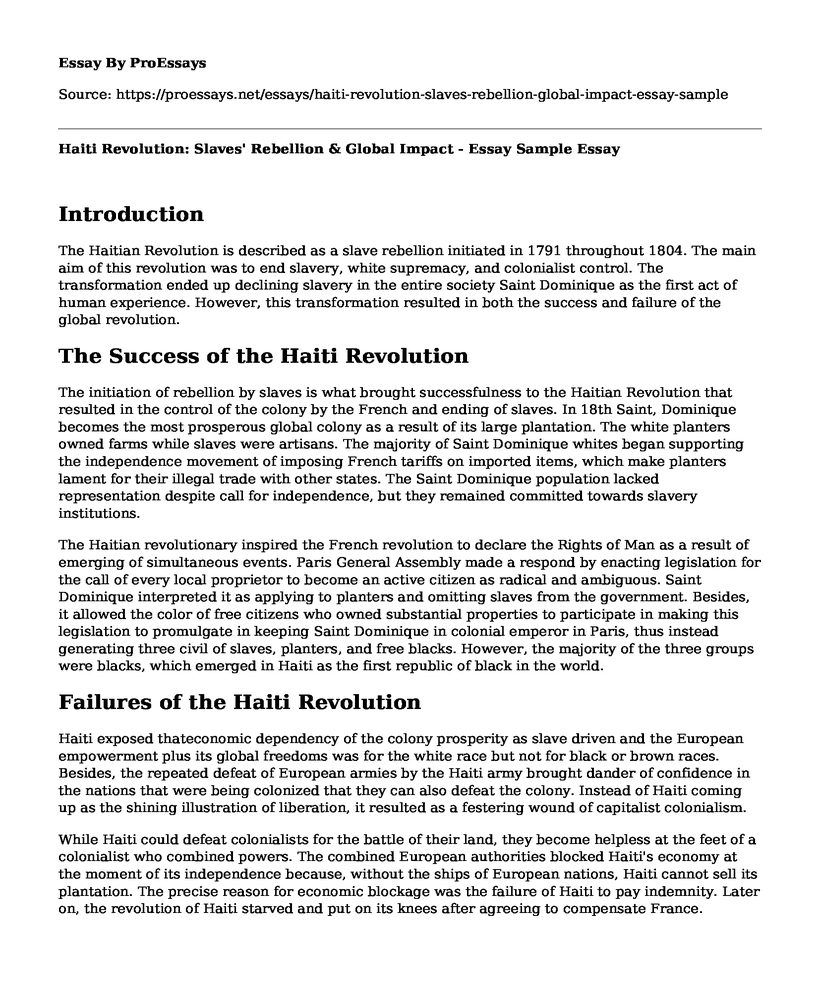Introduction
The Haitian Revolution is described as a slave rebellion initiated in 1791 throughout 1804. The main aim of this revolution was to end slavery, white supremacy, and colonialist control. The transformation ended up declining slavery in the entire society Saint Dominique as the first act of human experience. However, this transformation resulted in both the success and failure of the global revolution.
The Success of the Haiti Revolution
The initiation of rebellion by slaves is what brought successfulness to the Haitian Revolution that resulted in the control of the colony by the French and ending of slaves. In 18th Saint, Dominique becomes the most prosperous global colony as a result of its large plantation. The white planters owned farms while slaves were artisans. The majority of Saint Dominique whites began supporting the independence movement of imposing French tariffs on imported items, which make planters lament for their illegal trade with other states. The Saint Dominique population lacked representation despite call for independence, but they remained committed towards slavery institutions.
The Haitian revolutionary inspired the French revolution to declare the Rights of Man as a result of emerging of simultaneous events. Paris General Assembly made a respond by enacting legislation for the call of every local proprietor to become an active citizen as radical and ambiguous. Saint Dominique interpreted it as applying to planters and omitting slaves from the government. Besides, it allowed the color of free citizens who owned substantial properties to participate in making this legislation to promulgate in keeping Saint Dominique in colonial emperor in Paris, thus instead generating three civil of slaves, planters, and free blacks. However, the majority of the three groups were blacks, which emerged in Haiti as the first republic of black in the world.
Failures of the Haiti Revolution
Haiti exposed thateconomic dependency of the colony prosperity as slave driven and the European empowerment plus its global freedoms was for the white race but not for black or brown races. Besides, the repeated defeat of European armies by the Haiti army brought dander of confidence in the nations that were being colonized that they can also defeat the colony. Instead of Haiti coming up as the shining illustration of liberation, it resulted as a festering wound of capitalist colonialism.
While Haiti could defeat colonialists for the battle of their land, they become helpless at the feet of a colonialist who combined powers. The combined European authorities blocked Haiti's economy at the moment of its independence because, without the ships of European nations, Haiti cannot sell its plantation. The precise reason for economic blockage was the failure of Haiti to pay indemnity. Later on, the revolution of Haiti starved and put on its knees after agreeing to compensate France.
Conclusion
Haiti was a complete process that began the war of American independence. The fundamental principle of self-rule started by the Haitian Revolution depicting the sense that all nations are equal and can fight for their own. Revolution has both the definite success of Haiti, achieving it by becoming the first black republic, and it also has its contrary failure, like economic deterioration.
Cite this page
Haiti Revolution: Slaves' Rebellion & Global Impact - Essay Sample. (2023, Mar 10). Retrieved from https://proessays.net/essays/haiti-revolution-slaves-rebellion-global-impact-essay-sample
If you are the original author of this essay and no longer wish to have it published on the ProEssays website, please click below to request its removal:
- Essay Example: Infanticide in Hellenistic Greece
- Critical Essay on Frederick Douglass Speech: Black America Vision
- How Alliances Started the War of World War 1 Essay
- Paper Example on 9/11 Attack on The World Trade Centre And the Pentagon
- Treatment of War Veterans Essay
- The Historical Importance of Olaudah Equiano's The African Narrative Essay
- A Sociological Analysis of the Roles of Institutions in Slavery to Make It Function







